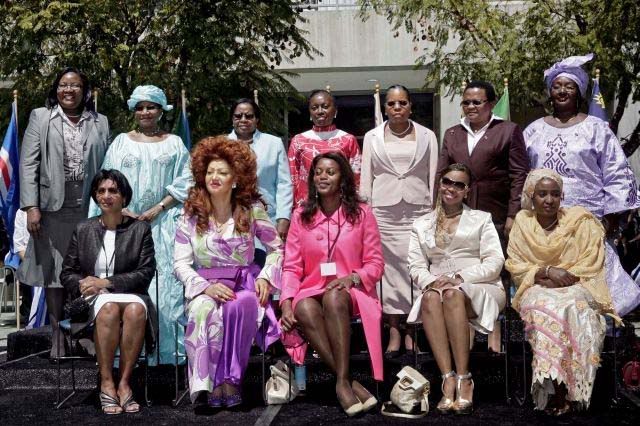While President Obama has just returned from the Summit of the Americas, another Summit has begun in Los Angeles.
Standing back row from left: Ida Odinga wife of Kenyan prime minister; Hadjia Laraba Tandja of Niger; Penehupifo Pohamba of Namibia; Thandiwe Banda of Zambia; Maria da Luz Dai Guebuza of Mozambique; Mathato Sarah Mosisili of Lesotho and Sia Nyama Koroma of Sierra Leone. Seated front row from left: Adelcia Barreto Pires of Cape Verde; Chantal Biya of Cameroon; Ana Paula Dos Santos of Angola; Queen Inkhosikati LaMbikiza of Swaziland and Dr. Turai Umaru Yar’Adua of Nigeria. (AP Photo/Nick Ut)
Organized by US Doctors for Africa and African Synergy, an NGO of 22 First Ladies from Africa, Leadership for Health will focus on maternal health, as well as girls’ education and HIV/AIDS related issues throughout Africa.
Reuter’s Reports:
African first ladies harness Hollywood star power
The two-day meeting, billed as the first such summit by the first ladies in the United States, will introduce the influential African women to California business leaders and health policy experts — as well as Hollywood stars.
“These first ladies already know Washington and New York. They thought that by coming to Los Angeles, some of the inspiration that inspires movie makers could also inspire them in their objectives,” Jean Stephane Biatcha, executive director of African Synergy, one of the organizers, told a Beverly Hills news conference on Thursday.
Movie stars Sharon Stone, Danny Glover and Billy Zane — all of whom have worked with charities in Africa — will help to host the April 20-21 event, which includes a celebrity luncheon.
“Lethal Weapon” star Glover, a former United Nations goodwill ambassador, told reporters that African women play a vital role in healthcare and in influencing the education of girls at home.
The meeting will bring together the first ladies of Angola, Kenya, Nigeria, Tanzania, Zambia, Swaziland and 10 other African countries with British Prime Minister Gordon Brown’s wife Sarah Brown, California Governor Arnold Schwarzenegger’s wife Maria Shriver and others.
Britan’s Daily Mail reports:
Nearly 600,000 women die each year from pregnancy-related complications worldwide.
The meeting hopes to raise awareness in Hollywood of various projects in Africa to supply clean water, fight malaria and combat AIDS.
The charitable group of 22 first ladies was formed in 2002 and is called African Synergy Against AIDS and Suffering. It was set up to highlight the vital role of women in education and healthcare in the world’s poorest continent.
Women in sub-Saharan Africa account for 57 percent of HIV infections and young African women are three times more likely to become infected than men of comparable age in the region, according to a 2006 United Nations Development Program report.
Covered widely in various African papers, there has been scanty coverage in the US press.
I hope that there will be a change in US/AID AIDS policies under the Obama administration, and that the first ladies will assist in counter-acting remarks made by Pope Benedict during his March visit to Africa:
The Pope today reignited the controversy over the Catholic church’s stance on condom use as he made his first trip to Africa.
The pontiff said condoms were not the answer to the continent’s fight against HIV and Aids and could make the problem worse.
Benedict XVI made his comments as he flew to Cameroon for the first leg of a six-day trip that will also see him travelling to Angola.
The timing of his remarks outraged health agencies trying to halt the spread of HIV and Aids in sub-Saharan Africa, where an estimated 22 million people are infected.

14 comments